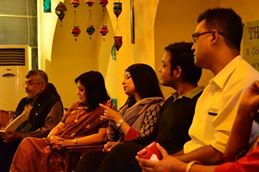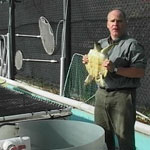The Thumb Print, the webzine or the magazine on the internet, has been in the news for quite some time for holding thought provoking discussions in Guwahati and other cities on issues that are of current concern. This time around, it got the cream of the city’s women to talk their hearts out on issues that touch their lives. And of course, men were also there to complement and supplement the views.
The Thumb Print Conversation on ‘Women & the changing Cityscape’, held in Terra Mayaa on March 8 to mark International Women’s Day was held in collaboration with the Ladies Emerging Wing of FINER (Federation of Industries & Commerce of North eastern Region). The conversation was unique in many ways. For a change, there were no chief guests to hog the limelight. Even though the day was that of women i.e. International day of the Women, men were, though significantly few in number, were given the privilege to initiate the discussion. Swapnil Bharali, eminent writer, led the discussion that was impressively moderated by Arman Ali, Executive Director of Sishu Sarothi, one of Assam’s most well known NGOs for differently-abled children.
Novelist Mitra Phukan said, “Women are more civilised on the streets. You don’t find them committing nuisance like the men do. But society should not be indifferent to their needs. There must be more toilets on roadsides for the women and of course for the men also.”
In this context, Swapnil Bharali stated that he had interaction with a large number of police personnel and was appalled at the fact the traffic police women who stand on duty on the streets for anything between six to eight hours a day on an average have no access to decent and dignified toilets. This is one issue for the society to address.
Florence Handique, popular anchor of electronic media, shared her nightmarish experiences of bringing up a girl child. She lamented that there were no proper crèches for the working women of Guwahati to leave their kids while going to work every day.
Miguel Das Queah, who works for child rights, found the ritual of ‘Tuluni Biah’, a function that is held to let people know that a girl has attained puberty, unfair in the sense that a girl, who is still a child, is exposed to situations which infringe upon her rights as a child.
Rituparna Roychoudury, a lawyer by education but a homemaker by choice, talked about the immense power that a woman wields in today’s society. She cited a few examples of women going out of the way to change the lives of less fortunate ones in their vicinity that touched everyone present.
Pomi Baruah, a civil services officer, related the plight of women personnel in government offices, particularly those posted in semi-urban and rural areas, with regard to civic, healthcare and hygiene issues. The society as well as the government needs to be more proactive in this matter and do things without waiting for aggrieved women to come and beg for it. Pomi also pleaded for awareness in the society to check harassment of women at work place.
Sriparna Barooah, a management professional and a trainer for entrepreneurs, quoted statistics from the McKenzie Report to bring out the difference between China and India in the sphere of women’s empowerment. She explained why India still has a long way to go to catch up with her neighbour.
Swastika Jain, healthcare professional, was of the view that ‘respecting the women’ should be a part of upbringing of a child in a family and then this should be followed up through school and college curriculum.
Nellie Ahmed Tanweer, founder of Maria’s group of educational institutions, said she was associated with a number of panels set up by the government to ensure that there is no violation of women’s rights. She, therefore, requested all present on the occasion to bring important matters to her notice from time to time and she would do her bit for resolving the issues.
Asha Bora, founder of Greenwood Resorts and Chairperson of Finer Ladies Emerging Wing (FLEW), informed that FLEW would be submitting a memorandum to the government for setting up/improving toilet facilities in girls schools and colleges.
Anindita Das rightly remarked at the end that like ‘One swallow doesn't make a summer’; this one conversation would not be able to solve all the problems that were brought up during the discussions. All the participants need to follow up the issues besides taking this up with persons who can intervene and bring a positive change in the prevailing conditions.
There were women from all walks of life, from lawyer to the teacher and from cabin crew trainer to entrepreneur, who vented out their feelings freely and convincingly at the conversation. All participants lauded the efforts of Teresa Rehman, editor of the webzine The Thumb Print, for conceptualising the idea of the conversation. And everyone appreciated the efforts of Juhie Saboo Singh, the vivacious entrepreneur and founder of Terra Mayaa for being a gracious host and offering the space and the warm cup of coffee, cookies and quiche.







































